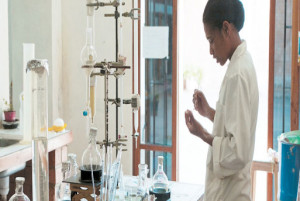According Enwemadu, the UMT includes a strip that is dipped into urine sample for 25 minutes to give results which can be read as positive, negative or valid, when compared against a control. “It is based on recombinant antibody technology which searches for malaria parasite in urine sample, and the strip indicates its presence or not,” Dr Eddy Agbo, chairman of Fyodor told LEADERSHIP. “There should be no guesswork by any health provider as to whether a patient has malaria or not,” he added. “We have a game changer in our hands.”
UMT has taken seven years in the making, and involved Johns Hopskins University, University of Maryland and University of Nigeria, Nsukka in discovery, clinical development and analysis. Researchers included partners at the National Malaria Elimination Programme recruited more than 2,000 people to take part in clinical trials for the test. It is considered the “first full-scale clinical trial for a medical product ever undertaken in Nigeria,” according to Agbo.
Dr Bridget Okoeguale, director of public health at the federal health ministry, said FMOH would consider working with its Roll Back Malaria partners to push UMT as a do-it-yourself malaria test that does not require bleeding or pricking. Fyodor has said it would use partnership with indigenous firm Geineth to make UMT available in hospitals, pharmacies, primary health centres and patent medicine stores around the country.
Source:Leadership online

 Scientists working in Nigeria have developed a new laser test that can detect malaria in humans within minutes with a simple urine test without drawing blood. Current malaria testing methods requires piecing with a needle to draw blood but the new urine malaria test (UMT), developed by Fyodor Biotechnologies, doesn’t require use of blood. The fast, non-invasive test can detect malaria in both humans and mosquitoes. It has advantages over current techniques because it does not depend on blood sampling, reagents, facilities or trained personnel.
Scientists working in Nigeria have developed a new laser test that can detect malaria in humans within minutes with a simple urine test without drawing blood. Current malaria testing methods requires piecing with a needle to draw blood but the new urine malaria test (UMT), developed by Fyodor Biotechnologies, doesn’t require use of blood. The fast, non-invasive test can detect malaria in both humans and mosquitoes. It has advantages over current techniques because it does not depend on blood sampling, reagents, facilities or trained personnel.




